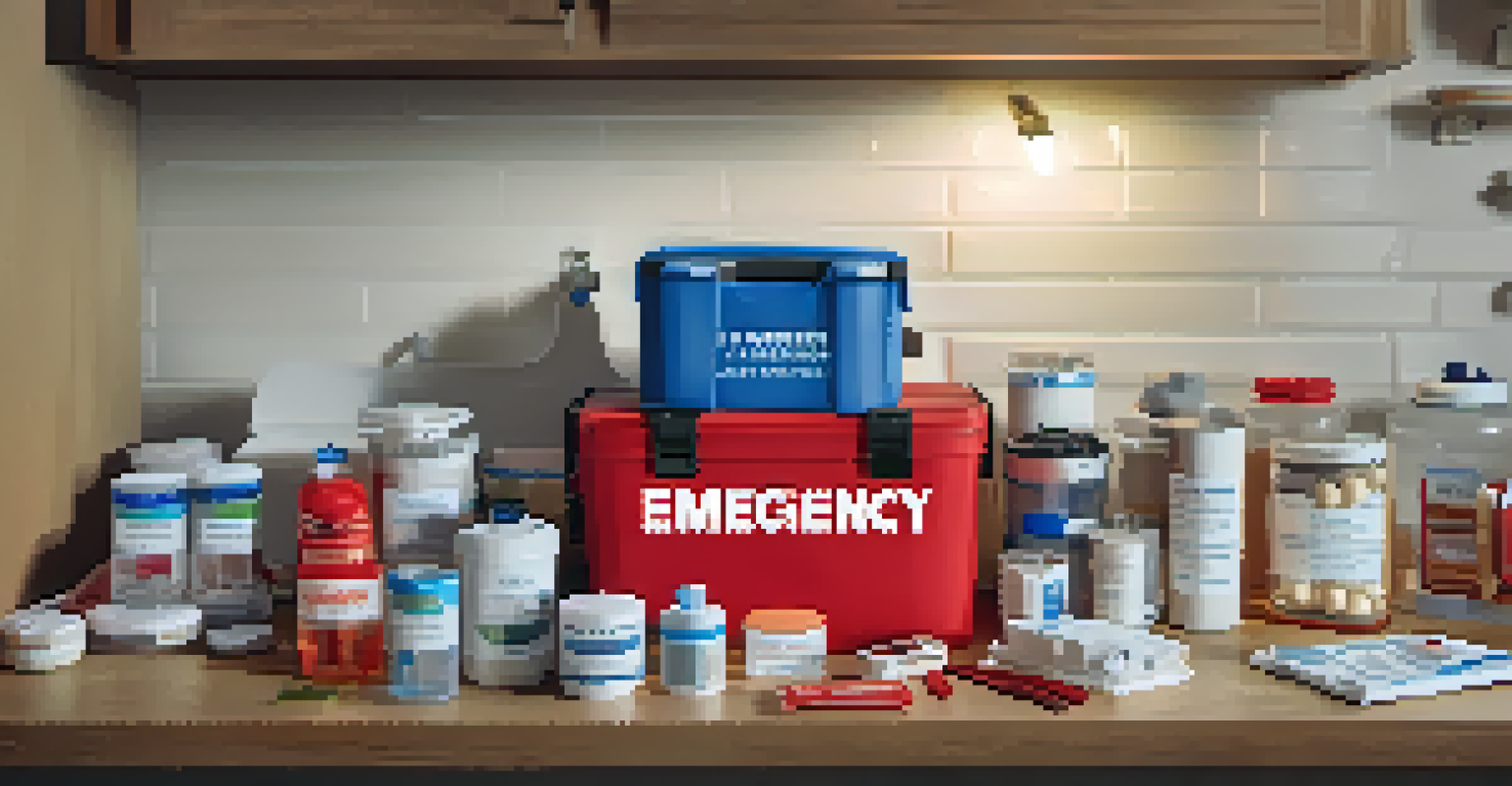Creating a Home Emergency Plan for Your Family

Understanding the Importance of an Emergency Plan
Having a home emergency plan is crucial for the safety and security of your family. It prepares you for unexpected events like natural disasters, fires, or medical emergencies. Without a plan, panic can set in, making it harder to respond effectively when every second counts.
By failing to prepare, you are preparing to fail.
When everyone knows what to do in an emergency, it reduces confusion and anxiety. Think of it like a fire drill at school; the more you practice, the more instinctive your actions become. By creating a plan, you're not only protecting your loved ones but also empowering them with knowledge.
Moreover, an emergency plan can save lives. It's not just about having a strategy; it's about developing a culture of safety within your home. This proactive approach fosters a sense of security, allowing your family to navigate emergencies with confidence.
Assessing Potential Risks in Your Area
Begin by identifying the potential risks your family might face based on your geographical location. For instance, if you live in an area prone to hurricanes, flooding, or earthquakes, it's essential to understand these specific threats. Research local hazards to tailor your emergency plan accordingly.

Consider factors like weather patterns, historical data, and community resources. This information will help you create a well-rounded plan that addresses the unique challenges your family might encounter. Engaging with your local community can provide insights into common risks and effective response strategies.
Importance of an Emergency Plan
Having a well-thought-out emergency plan prepares your family for unexpected events and reduces panic during crises.
By assessing these risks, you can prioritize your emergency preparedness efforts. In essence, knowing what you're up against allows you to allocate resources effectively—whether that's assembling a supply kit, securing your home, or planning escape routes.
Creating a Family Communication Plan
A family communication plan is vital for ensuring everyone stays connected during a crisis. Designate a primary and secondary contact person, especially if family members are separated during an emergency. This person should be someone outside your immediate area, as local lines may be overwhelmed.
Emergency preparedness is not just the responsibility of government; it is a shared responsibility that requires everyone to take action.
Establish meeting points where family members can gather if you get separated. This could be a neighbor's house, a local park, or a community center. Make sure everyone knows these locations and practices getting there, just like practicing a fire drill.
Additionally, ensure that everyone has a list of emergency contacts saved in their phones or written down. It's easy to forget phone numbers in a stressful situation, so having this information readily available can make a significant difference.
Developing an Evacuation Plan for Your Home
An evacuation plan is a crucial component of your home emergency strategy. Identify all possible exits from your home, including doors and windows, and ensure that everyone knows how to use them. Practicing your escape routes regularly helps make them second nature.
Consider special needs for family members, such as young children, elderly relatives, or pets. Make arrangements for how to transport them safely and quickly. Having a designated 'go bag' with essentials like medications, food, and water can streamline this process.
Assess Risks in Your Area
Identifying local hazards allows you to tailor your emergency plan effectively to address specific threats your family may face.
Remember to keep pathways clear of obstacles to facilitate a swift exit. In an emergency, even small barriers can slow you down, so ensure that your evacuation routes are regularly maintained and accessible.
Preparing an Emergency Supply Kit for Your Family
An emergency supply kit is your family's lifeline during a crisis. Gather essentials like water, non-perishable food, flashlights, batteries, and a first-aid kit. Aim for a supply that can sustain your family for at least three days, as some emergencies can disrupt access to resources.
Don’t forget important documents like insurance papers, medical records, and identification. Keeping these in a waterproof container will protect them from damage. Regularly check and update your kit to ensure everything is within expiration dates and in good condition.
Involve your family when assembling the kit. This not only helps everyone understand its importance but also makes it a fun bonding activity. Engaging your kids in the process can teach them valuable life skills, making them feel more prepared for emergencies.
Training Your Family on Emergency Procedures
Training your family on emergency procedures is just as crucial as having a plan. Conduct regular drills for different scenarios like fire evacuations, severe weather responses, or medical emergencies. These practice sessions help reinforce the steps everyone needs to take when it counts.
Use these training sessions to educate your family on first-aid basics, such as how to perform CPR or treat minor injuries. Familiarity with these skills can empower your loved ones to act confidently and effectively in a crisis.
Regularly Update Your Plan
Consistently reviewing and updating your emergency plan ensures it remains relevant as your family's needs and circumstances change.
Consider involving local emergency services in your training sessions. They can provide valuable insights and tips that may enhance your family's response. This collaboration also builds a connection with your community resources, fostering a sense of teamwork in times of need.
Reviewing and Updating Your Emergency Plan Regularly
A home emergency plan is not a one-time task but an evolving strategy. Regularly reviewing and updating your plan ensures it remains relevant and effective as your family dynamics change. Life events like moving to a new home, welcoming a new family member, or changes in health can all impact your plan.
Schedule periodic family meetings to discuss the plan, address any concerns, and practice emergency drills. This keeps everyone engaged and informed, reinforcing the importance of preparedness. Taking the time to revisit your plan builds confidence and keeps your family ready for any situation.

Remember, emergencies can happen at any time, and being prepared is key. By making it a family priority to review your plan, you're not just safeguarding your loved ones—you're also creating a resilient family unit that can face challenges together.